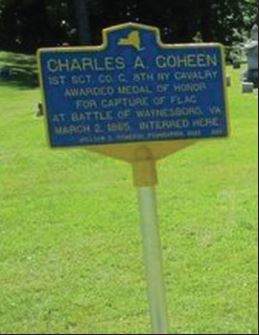
HF-L English teacher Andrea Borrelli, Jack Kelley, and Honeoye Falls Mayor Rick Milne at HF-L Middle School prior to last Saturday’s local premiere of Kelley’s new film Solver. Photo by Chris Carosa
This wasn’t the first time I sat down to interview Jack Kelley. The first time was in the winter of 1997/98 within the belly of what was then The Burke Group’s offices (that same building now houses KJT Group across from the Honeoye Fall Village Hall). The subject then was Jack’s application to Yale University. At the time, the leap to the Ivy league stretched across a chasm of the unknown. On one side lay the quaint comfort of Honeoye Falls. On the other side lay,… like Jack then, the reader has yet to discover. Jack knew one thing for certain: The way over this span required hard work, integrity, and a willingness to explore beyond that zone of comfort we’re all too familiar with.
Jack wasn’t born here, but in 1985, at the age of 5, his family moved into the house his father built on Drumlin View Drive. His entire public-school experience was within the HF-L School District. “My general impression was riding my bike around, playing with my friends, having squirt gun wars,” recalls Jack. He remembers it as “an ideal childhood.” While video games did exist back then, he spent most of his time outdoors playing sports. “My parents made us keep a log,” he says. “They permitted only so many hours a week to play video games or watch TV. I had to learn how to budget my time. It was tough. Imagine having to make this decision: Either He-Man or Teenage Mutant Ninja Turtles.”
Jack’s first real introduction to movies came through his regular visits to the Mendon Video Store in the Hamlet of Mendon’s Village Commons Plaza. He regularly rented movies there until his family moved to the village of Honeoye Falls when he was 13.
“I really got into making movies in middle school,” says Jack. “We had great teachers at Honeoye Falls. There was some kind of enrichment program and we had access to a VHS camcorder. We made these ridiculous movies. It was a lot of slapstick and doing impressions of people like Ross Perot.”
Things got more thoughtful, though, once he was in high school. “The first serious project I did was in High School in Kelly Tucker’s class,” says the 1998 HF-L grad. “I was good friends with Bill English, [who has since gone on to become an actor]. Together with my other friends, we would make these movies – Bill thinks he might have these movies in a shoebox at his parent’s house. We made this film about these young guys who ran away from home in hopes of finding a better life. They ended up getting beaten up by a bunch of thugs. It was kinda dark. Teenage angst and all that. We never finished it.”
On the Cougar athletic fields, Jack started playing soccer, but then moved to track. “I was the co-captain of the track team (yes, Bernie Gardner was the coach then),” says Jack. “I liked Bernie. He wasn’t just about doing it harder, like so many coaches are, he was more about intelligently training. We were undefeated until this one meet. I felt I contributed to this defeat because I was off on some college trip. I also wrestled, but I stopped senior year to focus on academics because, in order to get into the college I felt I was capable of getting into, I knew I was going to have to compete against the best of the best across the nation.”
At this point, Jack’s mind left his drifting distant memories and looked squarely at me. “Then I met you in 1997,” he said. “I remember going to a big office to meet you for my Yale interview. We both had less grey hair. You described something about analysis – I don’t remember about what – and I was impressed that there are old people who were smart.” This reporter is humbled.
Jack applied to all the usual Ivy League suspects. “I really liked Dartmouth, Brown, and Yale,” says Jack. “I briefly considered Harvard, but only because I knew someone who went there. I was most emotionally drawn to Yale, but at the time I ignored this feeling. I liked the gothic atmosphere of Yale. It possessed a Batman-like Gotham City type of attraction. I was from Honeoye Falls, so I couldn’t fathom what it was like to be in a big city. I liked the outdoors, small town feel of Dartmouth, but, in the end, Yale won.”
He entered Yale seeking to become a neuro-scientist, but graduated with a degree in architecture. His residential college – Davenport College – itself was an architectural hybrid, sporting a stern gothic façade while housing an elegant Georgian interior. He’s quite familiar with the spirit and aura of Davenport’s premiere living quarters – the Cottage – but he spent his time living off campus.
There were plenty of stops from Yale to Hollywood, all documented elsewhere. What brought Jack back to his high school alma mater and home town was the local premiere of his first full-length feature movie. On Saturday, January 6, 2018, local friends, family, and supporters crowded into the nearly filled to capacity Middle School auditorium to watch Solver, the movie Jack made. Jack didn’t forget his roots. He filmed several scenes in the Village of Honeoye Falls and the Hamlet of Mendon. Some locals even had cameo appearances in the film. Following the film, members of the audience asked questions. I got to sit down with him the following Monday for this interview.
If he had a chance to do the film over again, Jack told me he would have raised another 20% in the budget and hired more senior staff. “When we shot in Western New York, who was best qualified to scout the area?” says Jack. “I came out here, took pictures and put together a ‘location’ board (similar to a story board) that I showed our Director of Photography. The actual camera crew was great, but someone else had to do the scouting. It would have been great if that someone else wasn’t me, so I could have focused on other matters that only I could have done. “
Film distribution represents the most challenging part. “My business and legal experience in New York gives me a bit of an advantage,” says Jack. Still, that experience couldn’t shield him from what came after the film was ready to be shopped. “Distribution is the greasiest most brutally dark underbelly of the movie business,” says Jack. “A lot of film makers don’t understand what’s in the secret sauce once they hand off their movie to the distributor. You can include me among those filmmakers. The distributor’s sole job is to take the movie and distribute it to the audience. In other words, it’s all about logistics. For example, chain theatres are all about decision making from the top down. It’s therefore highly unlikely an independent film (like Solver) will screen there. There are rules about how many screens it has to be shown on, how long it needs to be screened, etc… I ran the numbers and decided not to go this route. The one thing we have at our advantage is that I can offer better economics to independent theater owners. For example, I talked to one theater owner. He told me the terms they got on Star Wars was 35 cents on the dollar. Typical terms with an independent film like ours would be a 50/50 split where the theater retains all the concession sales and there’s no upfront fee.”
Jack’s investment business background gives him a very analytical perspective on things (perhaps like that of a certain “old man” whose path he once crossed). “The fact is movie making is an inefficient business,” says Jack. “There are a lot of people who are trying to improve it. One executive told me the system is broken. I’m friends with accomplished screenwriters and they tell me everything is crumbling. Think of book stores, music stores, etc… where are those stores now? A lot of people say we’re going to say the same thing about films one day.”
“Our distribution model is different,” says Jack. “If you don’t have a major distributor handling the distribution, you have to build out your own network. It’s a lot of work. It requires a lot of manpower. The payback just isn’t there. Even the small to midsized theaters don’t provide the cash flow to justify the effort. That’s where internet-based distribution comes in. It’s leaner, meaning it’s cheaper for the consumer, creates a larger royalty stream for the artist, and gives the distributor a sustainable profit.”
Finally, I asked Jack to sum up his thoughts. He told me “People have to appreciate how good it is here. Not that we’re all rich or famous, but how we all learn to work hard, have integrity, and teach that. If you know how to work hard and have integrity, you can solve almost anything.”
And like the greatest puzzles, there’s always one more clue to find. Jack hinted at that clue, but alas, he didn’t reveal its secret. That remains a chasm to be crossed at a future time.






